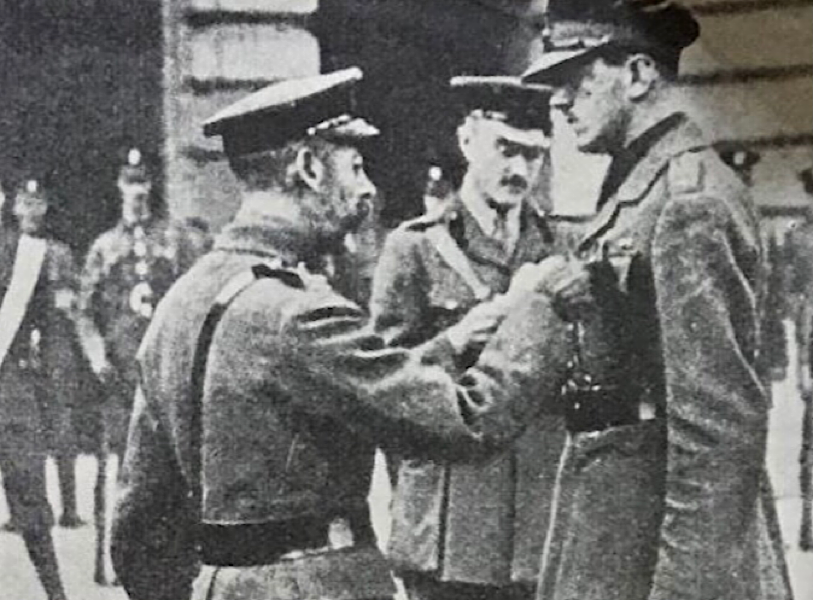| |
|
|
|
|

|
|
|
Alfred Oliver Pollard was born 4th May 1893 at Wallington, Surrey, to James Alfred and Ada Jayne (nee Payne). He had three sisters Lily Ada (1884), Eva Kate (1888) and Amy Grace (1891) as well as an elder brother James Frank (1889). Alfred was working as a clerk at Alliance Assurance Company at the outbreak of war and enlisted on 8th August 1914.
|
First entering the trenches at Kemmel, Belgium Alfred collapsed coming out of the line Christmas 1914 due to a chill on his liver. In June 1915 he was promoted to acting Corporal and the following September he was placed in command of the bombing platoon as well as being promoted to Sergeant. Whilst serving in the trenches at Hooge he was awarded the Distinguished Conduct Medal, the citation reading:
|
For conspicuous gallantry on the 30th September, 1915, at Sanctuary Wood, during the bombing fight. Although severely wounded, Serjeant Pollard continued to throw bombs, at the same time issuing orders to and encouraging his men. By his example and gallant conduct he renewed confidence among the bombers at a time when they were shaken, owing, to the enemy being in superior numbers and throwing many more bombs than were available on our side. He did not give up until he fell, severely wounded for the second time. |
Alfred was granted a commission in January 1916.
The Honourable Artillery Company was attached to the R.N.D. and Alfred undertook a night patrol on the Somme where he injured himself on rusty barbed wire. The wound became severely infected and he was evacuated for his recovery. His brother was killed whilst serving with the Grenadier Guards at Ginchy September 1916 and his name is commemorated on the Thievpal Memorial. James' death would have a large impact on Alfred's attitude to the war.
Returning for the operations on the Ancre in early 1917 Alfred was awarded the Military Cross for his actions at Grandcourt, the citation for February 7th-8th reading:
|
 |
|
For conspicuous gallantry and devotion to duty. He led a patrol and carried out a dangerous reconnaissance. Later, he assumed command of a company and repulsed two strong enemy counter-attacks. |
Holding the position for eight days under heavy shellfire only thirty-five of the men remained when they were relieved.
After the Division moved to the Arras sector Alfred received a bar to his MC on April 17th:
|
He carried out a dangerous reconnaissance of the enemy's front line under very heavy fire, and obtained most valuable information. He set a splendid example of courage and determination |
At Gavrelle he became the first man of the war to be awarded the Victoria Cross, Military Cross and Distinguished Conduct Medal. All of these decorations were presented by King George V at Buckingham Palace on 21st July 1917.

|
After the H.A.C. was detached from the Royal Naval Division Alfred trained Americans at Etaples before being attached to a U.S. division to advise on training. He was appointed Adjutant of No. 2 Reinforcement Camp and, in June 1918, he married Mary Ainsley, although the couple would divorce five years later. He was diagnosed with influenza in October. Following the Armistice he served with the Army of Occupation before being demobilised in February 1919, he remained with the H.A.C. until December 1921.
After the war Alfred was employed in a variety of jobs but was unable to settle in any of them. He eventually became a full time author, having more than sixty works published including Fire Eater: The Memoirs of a VC, as well as writing for provincial newspapers and undertaking some broadcasting work for the BBC. In September 1925 he married Violet Irene Swarbrick. Later he became a committee member of the VC and GC Association where he would build a close friendship with Bill Haine.
On 5th December 1960, Alfred died at his home in Bournemouth from coronary thrombosis. He was cremated and his ashes scattered at Bournemouth Crematorium.
|

|
|